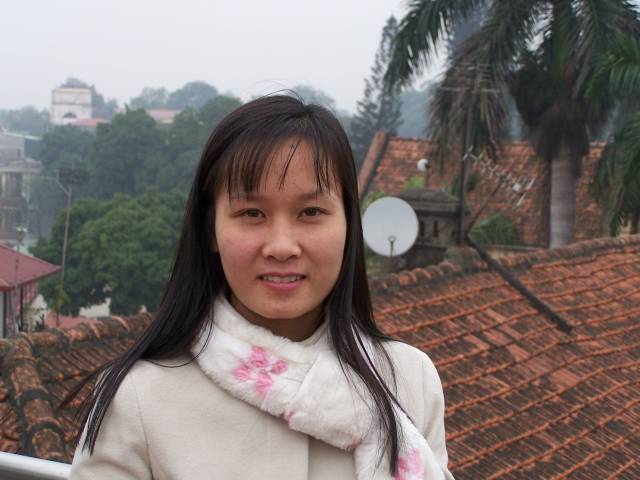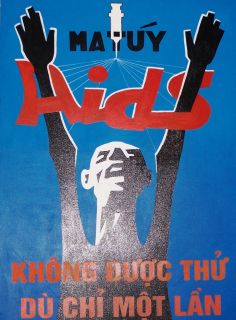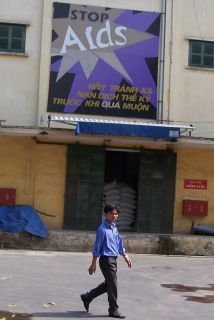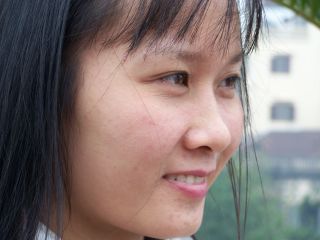|
IT COULD HAVE BEEN YOU...
During my term at the Danish Embassy, we decided to run a series on the Embassy website to highlight the contribution of Vietnamese women to develop modern Viet Nam. We identified a number of women, who has become successful in different ways.
A young woman from Hai Phong, ms. Pham Thi Hue made by far the strongest impression on us for her courage and stubbornness in defying the stigma that creates a double suffering for Viet Nam's AIDS/HIV victims.
Here is her story.

Pham Thi Hue (26) is a Vietnamese woman who makes a difference in the most admirable way.
Ms. Hue could be any other Vietnamese young woman from the port city of Hai Phong. She is a tailor and the young mother of a son, who recently turned four years old.
At first glance she appears to be very much like most young Vietnamese women: Charming, energetic with the sing-song voice and the frequent shy smiles.
The day she was diagnosed HIV-positive, her life changed dramatically. All of sudden her friends and even her parents turned her away - they were not able to imagine that a normal person would be exposed - only drug addicts and prostitutes got this dreaded disease.
What makes ms. Hue such an admirable difference is the way she has handled her personal tragedy. Many HIV-positive people choose to go in hiding, because they feel miserable and ashamed of themselves, as if it is their own fault.
Instead Ms. Hue chose to take action. She is now constantly campaigning to broaden the understanding and acceptance in Vietnamese society of the unfortunate HIV/AIDS victims.

A few years ago Aids was taboo in Viet Nam, but not anymore: Posters like these are on display all over the country.

"My husband is 31 years old, also having HIV/AIDS. He used to work as a cook in a big hotel in Hai Phong, but his boss asked him to leave, as soon as he learned that my husband is a person living with HIV/AIDS (PWH). He has stayed home since then. Luckily our son does not have the virus," says Pham Thi Hue.
The flamboyant flower group
In the past three years she has appeared a lot in Vietnamese mass media, and other HIV/AIDS victims have been encouraged to join her efforts:
"In early 2003 we decided to set up a group called Hoa Phuong Do (the flamboyant flower). We were 6 PWH's who decided to help each other, because most of us have no jobs and depend on our family for financial support.
Then three members died one after one, but more came forward. Now our group has eleven members. We have expanded our activities to help other PWHs, who are not in our group. We came to their houses, talked to their families to help them understand more about HIV/AIDS and its transmission.
We are taking care of the PWHs who develop AIDS and get more and more ill. We buy them things like clothes, blankets, and mosquito nets, since they are often very poor families. We also help to arrange funerals for people who died on the street. Those people had often been thrown out by their families."
Hotline at home
"We also hold two meetings every month in our district to give local people more information and knowledge on HIV/AIDS. About 25 come and listen to us during the meetings.
We have provided material and spiritual support to children of PWH, and offered our consultancy to PWH through a hot line, which is in fact my home number. We have done all this with the financial support from a NGO called CARE," says Pham Thi Hue.
Several other NGOs have also funded her activities.

Pham Thi Hue: "Now we receive less bad comments, when people recognize us in the streets."
"Just a few years ago the stigma and discrimination towards PWHs was very bad. I was quarantined in a separate room in the hospital where I had operation to give birth to my kid four years ago. I did not receive appropriate care then because all nurses and doctors were afraid of approaching me and my baby. They thought my baby was positive as well.
After that my family and my husband's family refused to receive us at home. They contributed money to rent an apartment for us to live in, and we had to take care of the baby by ourselves. We had no money, no food then. Our family brought us some meat and rice every once in a while. We were so miserable at that time."
After the past years of vigorous campaigning, Pham Thi Hue feels more confident about the future.
"I think it is changing. People look at us with less discrimination now. We receive less bad comments when people recognize us on the streets."
Coming home
"After a year living in the hired apartment, we were allowed to come home. My family now looks at me differently, much more respectful and sympathetic as they got to know more about HIV/AIDS. They understand what I am doing now."
"The information on HIV/AIDS given by the mass media should be changed in order to help people understand more, not just to scare them."
"Yes I think my group could be a good example for other groups in Vietnam as we are one of the first one implementing this model, and I think that other groups could be successful if they have enough persistence, enthusiasm and sympathy with PWH".
"I do have many hopes, but above all I really wish that in a near future, people will look at us with much more sympathetic eyes, as we are not bad people. We can be helpful still, we should not be discriminated and isolated, especially our children who has been put at very disadvantage so far, and suffered a lot from the social discrimination."
Pham Thi Hue's own son stays at home with his mother:
"Even though he is not HIV-positive, the kindergarten did not allow him to play with the other children. So I took him home, and I will never take him back to that place."
|